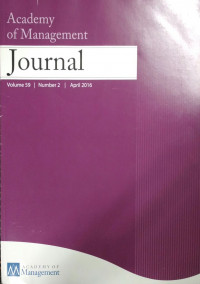
Academy of Management Journal Vol 59 No.2
| Gmd : Text
| Availability :
| 922020J | HD28 V59.No2 2016 | IPMI Kalibata | Available |
Africa is the beginning to capture the imagination of entrepreneurs, corporate executives, and scholars as an emerging market of new growth opportunities Over 15 years, the continent has experienced an growth rate of 5% (World Economic Forum. 2015: v). Out of its 54 countries, 26 have achieved middle-incone status, while the proportion of those living in extreme poverty has fallen from 51% in 2005 to 42% in 2014 (African Development Bank. 2014a: 49). Although there are regional differences, the primary drivers of growth have been rapidly emerging consumer markets, regional economic investment, investment in infrastructure, technology leap-frogging, and the opening up of new markets, especially in the service sector. African economies also face commensurate challenges. Across the continent, economies remain largely agrarian, underpinned by resource-driven growth and still dominated by the informal sector. But what is it about the context that makes Africa such a fertile territory for management scholarship? The greatest challenge to business in Africa stems from the persistence of institutional voids, under-standing as the absence of market-supporting institutions, specialized intermediaries, contract-enforcing mechanisms, and efficient transportation and communication networks (Khanna & Palepu, 2013). In order to be successful, the private sector that generates 90% of employment, two-thirds of investment. and 70% of economic output on the continent needs to cope with the challenges presented by undeveled market institutions and missing infrastructure (African Development Bank, 2013: 34). Neverthe- less, several new trends in recent years have been changing the ways business is done in Africa. The rapid expansion of information and communication networks-specifically, mobile technology-has provided tremendous new opportunities. By 2025, half of the people on the continent will have Internet access, connecting them to services in health care, education, finance, retail, and government (McKinsey Global Institute, 2010). Instead of playing catch-up, entrepreneurs in Africa are "hacking" existing infrastructure gaps through technology, connecting Africans to new good and service
| Series Title |
-
|
|---|---|
| Call Number |
HD28 V59.NO2 2016
|
| Publisher Place | New York |
| Collation |
727 p.: ill.; 30 cm
|
| Language |
English
|
| ISBN/ISSN |
0001-4273
|
| Classification |
HD28 V59.NO2 2016
|
| Media Type |
-
|
|---|---|
| Carrier Type |
-
|
| Edition |
Vol. 59 No. 2
|
| Subject(s) | |
| Specific Info |
-
|
| Statement |
-
|
| Content Type |
text
|







